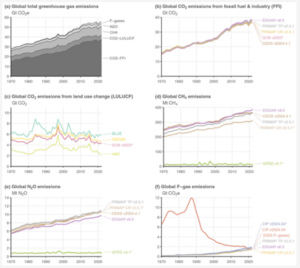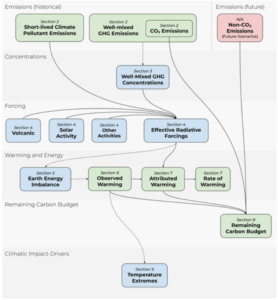
The earth experienced an unprecedented warming in 2023, hitting a new record with 92% of the increase attributable to human activities, shows a comprehensive analysis conducted by 57 scientists from around the globe. This alarming trend, documented in the annual Indicators of Global Climate Change report and published in the journal Earth System Science Data, points to the urgent need for concerted global efforts to address climate change.
The findings of the study are alarming: the rate of warming in 2023 reached 0.26°C per decade, surpassing the previous year’s rate of 0.25°C per decade. While this may seem like a minor difference, it represents the highest rate of warming ever recorded. The report attributes this trend to the accumulation of carbon dioxide from fossil fuel use. Last year alone, global temperatures were 1.43°C warmer than the 1850-1900 average, with 1.31°C of that increase resulting from human activities.
Despite the slight year-to-year increase, the long-term trend is clear and troubling. Over the past decade, human-induced warming has risen to 1.19°C, an increase from 1.14°C in the previous decade. This trajectory indicates that the world is perilously close to breaching the internationally accepted threshold for warming of 1.5°C, a point beyond which the impact of climate change is expected to become significantly more severe.
READ I Reforms agenda of Modi 3.0 will face challenges, delays
Human impact on climate change
While natural climate variability, such as El Niño events, has played a role in the record temperatures of 2023, the overwhelming driver remains human activity. The analysis shows that natural factors contributed only about 10% to the observed warming, with the remaining 90% attributed to human-induced factors. This distinction is crucial, as it emphasises that the current climate crisis is not a result of natural cycles but of human actions.

The reduction of sulphur pollution from shipping, which has a cooling effect on the climate, was offset last year by carbon particles from Canadian wildfires. Additionally, an undersea volcano released large amounts of heat-trapping water vapor and cooling particles into the atmosphere, effectively cancelling each other out. These findings highlight the complex interplay between natural and human-induced factors but reinforce that human activities are the dominant force behind the current warming trend.
The carbon budget and the way ahead
The remaining carbon budget, the amount of carbon dioxide that can be emitted before committing the planet to 1.5°C of warming, is alarmingly low. The report estimates this budget at around 200 gigatonnes, approximately five years’ worth of current emissions. This stark reality calls for immediate and substantial reductions in greenhouse gas emissions.

The world needs a multipronged approach to limit the damage. Rapidly reducing emissions from fossil fuels is paramount, as these account for approximately 70% of all greenhouse gas emissions. However, other sources, including cement production, agriculture, and deforestation, also contribute significantly to warming and must be addressed. Improving air quality by reducing particulate pollution will also help mitigate the rate of warming.
Building resilient societies
Building resilient societies becomes increasingly important to tackle the accelerating pace of climate change. The devastating impacts of wildfires, droughts, floods, and heatwaves witnessed in 2023 must not become the new normal. Policies and strategies to enhance resilience, such as improved infrastructure, early warning systems, and sustainable land management practices, are essential.
The upcoming COP29 climate conference in Baku, Azerbaijan, provides a critical opportunity for nations to commit to more ambitious climate actions. The new Indicators of Global Climate Change report aims to inform these discussions, providing policymakers with up-to-date and reliable data on key climate indicators. This data-driven approach is vital for evidence-based decision-making and effective climate policy.
The future of the planet hinges on the actions taken today. It is clear that human activities are driving climate change at an unprecedented rate, and without immediate action, the world risks reaching tipping points with catastrophic consequences.
The record-breaking warming of 2023 serves as a dire warning. The threat of the climate crisis is imminent, and the need for global cooperation and bold action has never been greater. By committing to substantial emissions reductions, enhancing resilience, and leveraging the latest scientific data, the world we can steer the planet towards a sustainable and habitable future. The time to act is now.
